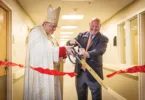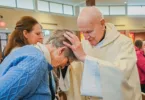
by Catherine Upchurch
Special to The Leaven
One of my grade school teachers, who happened also to be my mom, taught me and my classmates an important lesson about forgiveness. She helped us see that forgiveness is more than a feeling. If we wait for the feeling of forgiveness to come after having been hurt, we may wait too long. The hurt becomes a wound that leaves a scar.
On the other hand, she taught us that we should say the words, “I forgive you,” then do the work of being forgiving, and the feeling would follow. In my life, when I’ve been wise enough to follow her example, she’s proven to be right.
If we scour the Gospels, we will find numerous occasions when Jesus offers or teaches about forgiveness. Sometimes, it accompanies a physical healing, as is the case when Jesus heals the paralytic whose friends lower him through the roof to receive healing (Mk 2:1-12; Lk 5:18-26). Other times, forgiveness is given when requested, as in the story of the prodigal who returns home and asks his father’s forgiveness (Lk 15:11-32). Often, forgiveness is given freely without ever being asked, with the prime example being the words of Jesus from the cross: “Father, forgive them, they know not what they do” (Lk 23:34).
Perhaps forgiveness plays such a prime role in Scripture because, as hard as it is to give and to receive, it is what elevates our humanity. It is what demonstrates that we are made in God’s image and likeness. The whole of Scripture is a testament to God’s completely generous gift of mercy, and the shaping of a people who know they are forgiven over and over again.
The disciples of Jesus ask him to teach them to pray (Mt 6:9-15 and Lk 11:2-4). Of course, they knew how to pray the psalms because it was their prayer book, and they knew how to worship at the temple as was their tradition. But they are asking him to cut to the heart of what it means to pray, perhaps even to give them an example from his own very evident life of prayer. What Jesus teaches them is what we call the Our Father or the Lord’s Prayer. The words of this prayer reach a crescendo in praying for forgiveness.
We pray first of all to the God who is our Father, who parents us and teaches us what it means to be his children. We acclaim that God’s name is holy, sacred and incomparable to any other name on earth. We pray that the kingdom come into our world — not that we go to the kingdom in another world, but that we recognize it in our midst.
One of the ways we will recognize God’s kingdom is by doing God’s will and recognizing God’s will is needed in our world. We ask for daily bread, a deepening awareness that what nourishes us best comes from God. We pray that we be forgiven as we forgive others, which is basically a prayer that we learn to be as generous to others as we know God is to us.
Years ago, I participated in a retreat directed by Father Nicholas Ayo, CSC, author of a small book, “The Lord’s Prayer.” He was talking with us about the final petition: “Do not subject us to the final test.” One of the retreatants asked what kind of God would put us to the test.
Father Ayo answered as the professor he was, reminding us that the best teachers want their students to succeed, and testing is one way of determining if the teacher has done enough to ready them for the final exam.
God is that teacher who wants us to embody the kingdom as did his own son Jesus. He offers forgiveness and asks us to do the same.
Catherine Upchurch, the general editor of the Little Rock Catholic Study Bible, writes from Fort Smith, Arkansas.
Unto others
Our capacity to be forgiving is directly related to realizing that God forgives us, even when we lack the courage or humility to ask for it. Learning to accept and offer forgiveness is part of what shapes us in the image of God that is at the core of who we are.
Questions for reflection or discussion:
1. Do you agree that the capacity for forgiveness is something that elevates our humanity? One of the signs that we are made in God’s image? Why or why not?
2. The act of forgiving someone who has not asked for it, or may not even be aware of the hurt they have caused, is a way of imitating Christ. It also has positive emotional and psychological benefits. Does such a situation in your life come to mind to illustrate this?
3. Allow some time to slowly and deliberately pray the Lord’s Prayer (using the version we use in Mass, or the version from Lk 11 or Mt 6). Which of the petitions in that prayer seems most critical in our world today?
4. “Forgive us our trespasses as we forgive those who trespass against us” may also be translated “forgive us our debts as we forgive those indebted to us” or “forgive us our sins as we forgive those who do evil to us” or even “forgive us what we owe to you as we forgive those who owe anything to us.” What do these various translations tell you about the importance of forgiveness in the life of those building the kingdom of God?







Keep me and my family in your prayers!